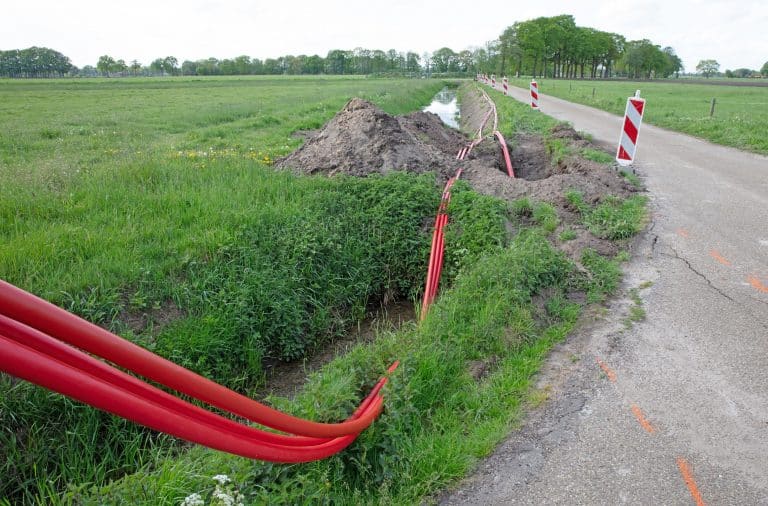Kandiyohi County continues to move toward its goal of border-to-border high speed internet access with dial-up speed.
On Tuesday, Connie Schmoll, Business Development Manager of the Kandiyohi County & City of Willmar Economic Development Commission (EDC), gave a presentation before the Kandiyohi County Board of Commissioners – which included newly-elected commissioners Steve Gardner and Duane Anderson – about the county’s status in achieving border-to-border high speed Internet.
“We have a long way yet to go in Kandiyohi County,” Schmoll told the board. “We are behind the mark as far as a county in the state of Minnesota. “
With the exception of Kandiyohi County’s main corridor extending from Willmar to New London, the majority of the county’s internet access is considered either unserved or underserved by the Minnesota Department of Employment and Economic Development (DEED).
Since 2017, the EDC has made border-to-border broadband internet access its priority, with an emphasis on fiber-optic broadband because it would provide the infrastructure needed as internet technology continue develop and grow.
“If we spend money on any other technology right now, we are going to be doing it again in a few years, “ Schmoll said
Though the county has been hindered – especially by the onset of the COVID-19 pandemic – in providing high speed internet access, it is making some strides. The rural Minnesota internet provider LTD Broadband recently won an auction by the Federal Communications Commission and, if they complete their application are slated to install fiber-optic broadband to large swaths of southern Kandiyohi County.
Still, the county’s northwestern townships remain drastically underserved.
According to a feasibility study conducted by the EDC last year, it would cost $3,983,391 to install fiber-optic broadband in the northwestern townships of Dovre, Mamre and St. Johns, with infrastructure accounting for 79% of cost.
Though internet service provider Aarvig – who would be providing the internet in the townships – pledged to provide up to 15% of the project cost, the EDC is dependent on government grant money and local investment, because internet providers will not show a profit installing the infrastructure in sparsely populated regions of the county.
“Unless there is a local investment in these projects, it won’t go through, “ Schmoll said.
To procure the local match, Dovre, Mamre and St. Johns polled their residents to determine their need for high-speed internet. Though county and state officials may see the urgency for border-to-border high speed internet, the local response was lukewarm. St. Johns declined the project, stating that providing their share of the funding would mean too steep of a hike in property taxes, and that the EDC would need more funding to move forward; Mamre fell short of the 75% of the required vote; and Dovre was beginning to educate its residents on the project when COVID-19 hit and brought the project to a halt.
“By putting a dollar amount on the townships, it becomes much more doable. I believe if the board is interested in this at that rate we can make that work, “ County Administrator Larry Kleindl said. “I’m really excited about having to formulate this. I think we could make this work. “
In order to fund the bulk of the project, the EDC will be applying to the Border to Border Broadband Development Grant Program from DEED – which provide grants to counties to provide high speed internet access. The maximum the EDC can apply for is either 50% of the project costs, or $5 million total. However, if the EDC keeps their grant request under 50%, they will be more likely to be approved for a grant, Schmoll said, and will instead ask for 45% of the project costs. If the EDC is granted the funds, the townships would have to cover the remaining $1,120,017. However, the state Legislature still needs to provide funds for this year’s Border to Border Broadband Development Grant Program.
“When they do that, if they do that, we need to be ready with a shovel-ready project and a funding plan that works for everybody, “ Schmoll said.
In October, the County Board used funds from the federal Coronavirus Aid, Relief and Economic Security Act, or CARES act, to conduct a market study to determine broadband speeds across the county. Schmoll said that she hopes the study could bring another township into the fold.
“I think it’s critical that we consider participating as a county, “ said Commissioner Rollie Nissen, who represents the northwestern townships on the County Board.
With large amounts of workers now working remotely due to the pandemic, and a significant portion of them likely to continue to work remotely after the pandemic, the county’s economic development will be severely impacted if it fails to provide border-to-border broadband access, said Commissioner Roger Imdieke, who warned that if Kandiyohi County fails to offer high speed internet access, potential residents will simply move to a county that does have it.
“I think it really behooves us to continue to work towards this, “ he said.
Lakes Area Review by Macklin Caruso, Reporter

